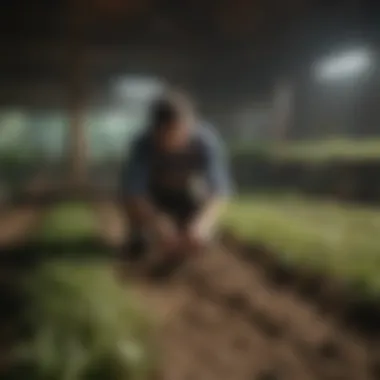Vian Public Schools: Navigating Educational Landscapes


Intro
Vian Public Schools plays a crucial role in shaping the educational landscape within its community. The school is deeply embedded in its agricultural roots, which influences both its curriculum and philosophies. Understanding how such frameworks operate can enlighten educators, policymakers, and community members about the significance of integrating local agricultural contexts into educational strategies. This article aims to delve into Vian Public Schools, examining essential elements, challenges faced, and the community’s impact on educational practices.
Current Trends in Agriculture and Horticulture
In modern times, the intersection of education and agriculture has become increasingly important. Schools like Vian Public are exploring advancements in agricultural education to better prepare students for the future.
Overview of Recent Innovations
Recent innovations in agriculture focus on efficiency and sustainability. Techniques such as precision farming and organic gardening have gained traction. These methods encourage farmers to maximize their yield while minimizing environmental impact. Vian Public Schools has adopted certain aspects of these innovations within their curriculum to ensure students receive up-to-date education reflecting current agricultural practices.
Sustainable Practices Gaining Popularity
Sustainability in farming has emerged as a priority. Education around these practices is vital for young minds to embrace responsible farming. Vian Public Schools promotes courses that emphasize the following:
- Crop rotation: Alternating crops to maintain soil health.
- Water conservation: Efficient irrigation practices to save water.
- Biodiversity: Encouraging diverse crops to enhance soil resilience.
These practices push students to think critically about their impact on the planet and provide them a framework for making informed choices in their future careers.
Essential Farming Techniques
Farming techniques are fundamental for both practical skills and educational content in Vian’s curriculum. By focusing on these areas, students gain the necessary tools to thrive in agricultural careers.
Soil Health Management
Soil is the foundation of all agriculture. Understanding how to maintain soil health is essential. Vian Public Schools integrates soil science lessons, covering:
- Soil composition: The importance of minerals and nutrients.
- Organic matter: Enhancing soil fertility through compost.
- Soil testing: Practical skills in assessing soil health.
These lessons prepare students to approach farming sustainably.
Pest and Disease Control Strategies
Managing pests and diseases represents one of the biggest challenges for farmers. Vian Public Schools teaches students proactive strategies, including:
- Integrated pest management: Combining biological, cultural, and mechanical practices.
- Crop diversity: Reducing susceptibility to pests through varied planting.
- Biological controls: Utilizing natural predators to manage pest populations.
Understanding these concepts helps future farmers safeguard their crops effectively.
Tools and Technology in Farming
The agricultural sector's technological advancements have rapidly evolved, making it essential for educational institutions to incorporate these tools into training.
Overview of Advanced Farming Tools
Vian Public Schools has incorporated technology into its curriculum by introducing students to:
- Drones for monitoring crops.
- Soil sensors for real-time data collection.
- Automated irrigation systems.
These tools help in familiarizing students with the equipment they might use in their careers and enhance their understanding of modern farming.
Case Studies on the Use of Technology
Real-world applications provide valuable insights. Vian Public Schools analyzes successful case studies, allowing students to see technology's impact firsthand. Examples of local farmers utilizing tech solutions give students relatable contexts to apply their learning.


"Cultivating the next generation of agricultural leaders requires a strong foundation in current practices and technology."
The strategies employed by Vian Public Schools bridge the gap between theory and practice, equipping students to meet tomorrow's agricultural challenges.
Overview of Vian Public Schools
Understanding Vian Public Schools is essential to grasp the educational landscape they foster. This overview presents key insights into the historical framework, mission, and vision that shape the institute's identity. Such an understanding does not only illuminate the institution’s goals but also reflects on how these goals impact the surrounding community and student engagement.
Historical Context
Vian Public Schools were established with a commitment to serving the local population, rooted deeply in agricultural traditions. Over the years, they have adapted to meet changing educational demands while maintaining their core values. The historical context is vital as it demonstrates the evolution of educational practices within this unique setting. The school has faced various challenges, but its resilience showcases a dedication to continuous improvement.
Mission and Vision Statements
The mission of Vian Public Schools focuses on providing a relevant and engaging education for all students. This mission emphasizes a student-centric approach that prioritizes individual learning needs and community involvement. The vision aims to create a supportive and inclusive educational environment where every student can thrive.
- Mission Highlights:
- Vision Goals:
- Foster academic excellence
- Encourage critical thinking and problem-solving skills
- Promote community partnerships to enhance educational experiences
- Equip students with practical skills for future success
- Create a safe and nurturing school climate
- Inspire students to be active participants in their communities
Overall, comprehending these elements illuminates the broader scope of Vian Public Schools. It highlights their commitment to adapting educational practices that benefit students and the community alike.
Educational Philosophy
Educational philosophy serves as the backbone of Vian Public Schools, influencing teaching methods, curriculum design, and student engagement. It is not merely a theoretical framework but a practical guide that shapes how education is delivered and received. A well-defined educational philosophy promotes a clear understanding of the values and priorities that inform decision-making, directly impacting the effectiveness of educational approaches within the school.
An essential component of this philosophy is the recognition of diverse learner needs. By addressing these needs, Vian Public Schools can create an inclusive environment conducive to learning. Educators are compelled to understand individual differences, adapting instruction to mesh with varied learning styles and backgrounds. This adaptability not only fosters academic success but also nurtures a supportive community where students feel valued.
Student-Centered Learning
Student-centered learning lies at the heart of Vian's educational approach. This model empowers students by placing their interests, goals, and experiences at the forefront of the learning process. The emphasis shifts from the teacher's agenda to the active participation of the learners. This approach encourages critical thinking and problem-solving skills, vital for navigating today's complex world.
Through various methods, such as project-based learning and collaborative group work, students engage in hands-on experiences that deepen their understanding of the material. Such experiences bridge the gap between theory and practice, allowing students to explore real-life applications of their studies. In this context, students are not passive recipients of knowledge. Instead, they become drivers of their educational journey, equipped with skills for lifelong learning.
Curriculum Development
Curriculum development in Vian Public Schools reflects a commitment to adaptability and relevance. The curriculum is designed to meet state standards while also considering the unique needs of the local community. This dual focus ensures that the education provided is not only compliant but speaks to the students’ contextual realities.
With continuous evaluation, the curriculum remains dynamic. Educators regularly assess its effectiveness and make necessary adjustments based on student performance and feedback. The inclusion of agricultural education, for instance, highlights the school's focus on practical skills that students can employ within their communities. By integrating pertinent content, Vian Public Schools prepares students for both academic advancement and workforce readiness.
Role of Technology
In an increasingly digital world, technology plays a critical role in Vian Public Schools’ educational philosophy. It shapes both teaching methods and student learning experiences. With an array of tools, such as interactive software and online resources, teachers can enhance traditional instruction methods. Technology also offers students opportunities for independent exploration and research, fostering a sense of ownership over their educational tasks.
However, adopting technology is not merely about modernization. The focus is on how these tools can support learning objectives and outcomes. For example, integrating agricultural technology into the curriculum helps students understand contemporary farming practices. This integration establishes correlations between theoretical knowledge and practical applications, essential for farmers and agricultural enthusiasts.
"Every learner is unique, and adapting teaching methods is vital for creating an environment where everyone can thrive."
Vian Public Schools’ educational philosophy reflects a commitment to nurturing an inclusive, engaging, and relevant learning environment. By placing students at the center, adapting the curriculum to meet local needs, and utilizing technology thoughtfully, the school promotes an educational experience that prepares students for future challenges.
Key Programs and Initiatives
Key programs and initiatives play a crucial role in shaping the educational landscape of Vian Public Schools. These programs not only cater to the diverse interests and needs of students but also participate in the community's broader objectives, especially in areas like agriculture, arts, and special education. Understanding these initiatives provides insight into how Vian Public Schools strives to enhance student engagement and foster academic growth.


Agricultural Education Programs
Agricultural education programs at Vian Public Schools serve several important functions. They provide students with hands-on experience in various aspects of farming and agribusiness. This hands-on approach helps students grasp essential concepts in sustainable farming practices, crop management, and animal husbandry.
The curriculum typically includes classes that cover topics such as soil science, plant biology, and agricultural technology. Beyond academic instruction, these programs often emphasize the importance of community involvement. Students frequently engage in projects that benefit local farmers and the surrounding community. This connection enriches their understanding of how agriculture influences their lives and the economy.
Additionally, partnerships with organizations like the national Future Farmers of America (FFA) provide further opportunities for student engagement and development. Participation in competitions and local fairs gives students a chance to showcase their skills, enhancing both their confidence and resume.
Arts and Sports Initiatives
Arts and sports initiatives are also significant in fostering a well-rounded education. Through a diverse array of programs, Vian Public Schools encourages students to express themselves creatively and physically. Arts programs, including music, theater, and visual arts, allow students to explore their creativity while enhancing skills like teamwork and discipline.
Participation in arts fosters emotional intelligence, which is crucial for personal development. It encourages critical thinking and helps improve overall academic performance. Similarly, sports programs promote physical health while teaching essential life skills such as leadership, teamwork, and perseverance. Regular involvement in athletic activities promotes not just fitness but also a sense of community.
Special Education Services
Special education services are a foundational element of Vian Public Schools' commitment to inclusivity and equal opportunity in education. These services are designed to cater specifically to the needs of students with disabilities. Individualized Education Programs (IEPs) are crafted for students, outlining tailored strategies for their learning. This ensures that all students, regardless of their challenges, have access to quality education.
These services include interventions such as speech therapy, occupational therapy, and personalized teaching methods. Close collaboration between teachers, support staff, and families is vital. Together, they create an environment where every student can thrive. It is essential that these services are continually assessed to maintain their effectiveness and to adapt to the students' evolving needs.
Community Engagement
Community engagement is essential to the success of Vian Public Schools. Combining efforts from faculty, students, and the community adds depth to educational experiences. This collaboration creates a rich learning environment that benefits all stakeholders.
Parental Involvement
Parental involvement remains a cornerstone of educational success at Vian Public Schools. When parents engage with their children’s learning, it builds a strong foundation for academic achievement. Parents contribute by attending school events, volunteering in classrooms, and supporting homework at home. This participation fosters a sense of responsibility among students, encouraging them to take their education seriously.
Additionally, regular communication between schools and families helps identify areas needing improvement. Transparents channels of communication build trust. Schools provide parents with updates through newsletters and social media platforms. This keeps families informed of important events and encourages them to take an active role in their child’s education.
Community Partnerships
Community partnerships are vital for enhancing educational opportunities. Schools collaborate with local businesses and organizations to provide resources, mentorship, and internships for students. These partnerships enrich the curriculum and offer practical experiences that align with real-world applications.
Through community partnerships, students learn valuable skills that prepare them for the workforce. For example, local farms might host students for agriculture-related projects. These experiences develop skills in crop management, animal husbandry, and environmental stewardship, critical for aspiring agricultural professionals. Moreover, these relationships support the economy by creating a skilled workforce rooted in the local community.
Service Learning Opportunities
Service learning opportunities further connect Vian Public Schools to the community. This approach integrates meaningful community service into the academic curriculum. Students are involved in projects that address community needs while gaining practical skills.
Involvement in service projects allows students to develop a sense of empathy and social responsibility. They participate in activities such as food drives, environmental cleanups, or assisting in local shelters. Each project enhances civic engagement and fosters a commitment to the community.
Educators at Vian Public Schools encourage students to reflect on these experiences. By discussing what they learned, students deepen their understanding of community issues. This reflective practice encourages critical thinking and nurtures future leaders prepared to tackle societal challenges.
"Engagement with the community helps students to connect their learning to the world around them, fostering an appreciation for civic responsibility."
Community engagement, therefore, serves as an important pillar for Vian Public Schools. This approach not only enriches the educational experience but also builds a stronger, more connected community.
Challenges Facing Vian Public Schools
The landscape of education is ever-evolving, and Vian Public Schools is no exception. Understanding the challenges that the institution faces is crucial for grasping its overall effectiveness and adaptability. These challenges affect not only the operation of the schools but the experiences of students and the community at large. Addressing these issues is vital for maintaining a robust educational environment focused on student success.
Funding Issues
One significant challenge for Vian Public Schools is funding. Public education is often reliant on state and federal resources, and fluctuations in these budgets can severely impact school operations. The allocation of funds determines essential needs, such as educational materials, technology investments, and teacher salaries. Limited funding may lead to larger class sizes, inadequately staffed programs, and aging infrastructure.


Moreover, as schools seek to enhance their curricular offerings, any deficits in funding can hinder their ability to adopt innovative resources. Consequently, this situation hampers not only student engagement but also their long-term academic success. Stakeholders must realize the critical role of adequate financial investment in fostering a quality educational experience.
Staff Retention
Another pressing challenge at Vian Public Schools is staff retention. Educators form the backbone of any educational institution, and their stability speaks volumes about the working conditions and support systems in place. High turnover rates can disrupt the continuity of education, affecting relationships built between students and staff. Moreover, the constant cycle of hiring and training new personnel can strain resources that could be better utilized in direct educational improvements.
Attraction and retention of skilled teachers require a comprehensive approach. Competitive salaries, professional development opportunities, and supportive administrative environments are all essential to keep talented educators in place. Schools that value their staff are more likely to see better student outcomes and a richer educational community. Therefore, addressing staff retention should be a priority for effective schooling.
Adapting to Change
Vian Public Schools faces the continual pressure of adapting to change. In today's fast-paced educational landscape, changes in curriculum standards, technological advancements, and shifts in student demographics require agility and foresight. Schools must remain ahead of these evolving needs to provide relevant, responsive educational experiences.
An effective adaptation not only involves incorporating new technology into the classroom but also embracing pedagogical strategies that cater to various learning styles. Schools must also be receptive to feedback from students and parents, ensuring that their offerings remain aligned with community expectations and supports.
"Adaptation is not just about surviving the changes; it is about thriving within them."
Establishing a culture of flexibility among educators and administrators is crucial. This encourages original thought and innovation, essential components for preparing students for the future job market, where adaptability is paramount.
In summary, while Vian Public Schools successfully navigates its complexities, challenges related to funding, staff retention, and adaptability require ongoing attention. Focus in these areas can lead to better educational outcomes, ensuring that the school meets the needs of its students and community.
Future Outlook
The future outlook for Vian Public Schools is fundamental to understanding its trajectory and potential impact on the community and educational landscape. This section will focus on strategic planning, innovative practices, and long-term vision. Exploring these elements can reveal the benefits and considerations needed to ensure the school continues to meet the needs of its diverse student population.
Strategic Planning
Strategic planning is essential in setting a clear direction for Vian Public Schools. It involves identifying goals, assessing resources, and developing actionable steps to achieve objectives. The planning process helps to align the school’s mission and vision with the educational needs of students.
An effective strategic plan can address:
- Academic performance improvement
- Resource allocation
- Community engagement strategies
Key stakeholders, including teachers, parents, and community members, must be involved in the planning process. This inclusivity ensures that the strategies developed are relevant and address the actual needs of the students and the community. Regular assessments are also crucial to gauge the effectiveness of these plans and make adjustments as necessary.
Innovative Practices
Innovation plays a vital role in the growth of Vian Public Schools. By incorporating new methodologies and teaching techniques, the school can enhance student engagement and learning outcomes. These practices might include:
- Project-based learning that connects classroom knowledge to real-world applications.
- Enhanced technology use for interactive learning experiences.
- Collaboration with local farmers for specialized agricultural education and internships.
Adopting innovative practices does not only support academic achievements but also fosters a culture that values creativity and critical thinking. Vian Public Schools can set itself apart by embracing change and adapting to evolving educational trends.
Long-Term Vision
A long-term vision is essential for the sustainability and effectiveness of Vian Public Schools. This vision should include aspirations for academic excellence, community integration, and social responsibility. Important components of this long-term vision may include:
- Developing a workforce-ready curriculum that aligns with industry needs.
- Sustainability initiatives that promote environmental stewardship among students.
- Continued enhancement of facilities and learning environments to support diverse learners.
Having a clear long-term vision allows Vian Public Schools to keep focus amidst challenges. It encourages the pursuit of new opportunities and partnerships that enrich the educational experience, preparing students not only for immediate success but also for their future endeavors.
"To achieve great things, two things are needed: a plan, and not quite enough time."
Closure
In concluding the examination of Vian Public Schools, it is essential to reflect on the myriad of factors at play that shape the educational landscape. This section synthesizes the findings from the previous sections, stressing the significance of understanding the dynamics within the school system. The mission and vision of Vian Public Schools drive their educational philosophy, demonstrating a commitment to developing student-centered learning environments that embrace technology and innovative practices.
Summary of Findings
The analysis highlighted several critical elements of Vian Public Schools. Key aspects include the historical context that informs current practices, the impactful programs that cater to various student needs, and the engagement with the broader community. Notably, the agricultural education programs stand out, linking educational outcomes with local farming practices. This relevance ensures students are equipped with practical knowledge that could benefit both their careers and local economies. The challenges discussed, such as funding and staff retention, underline the ongoing need for effective strategic planning tailored to reflect both current needs and future aspirations.
Call for Continued Engagement
It is vital to advocate for ongoing community involvement and support for Vian Public Schools. Stakeholders, including parents, local businesses, and agricultural organizations, play a crucial role in nurturing the school environment. Continued engagement fosters a rich educational tapestry that enables students to thrive. Encouraging active participation in school initiatives and programs is essential, as it creates a collaborative atmosphere that enhances learning opportunities. Ultimately, the future of Vian Public Schools hinges on collective action and investment in educational excellence.



